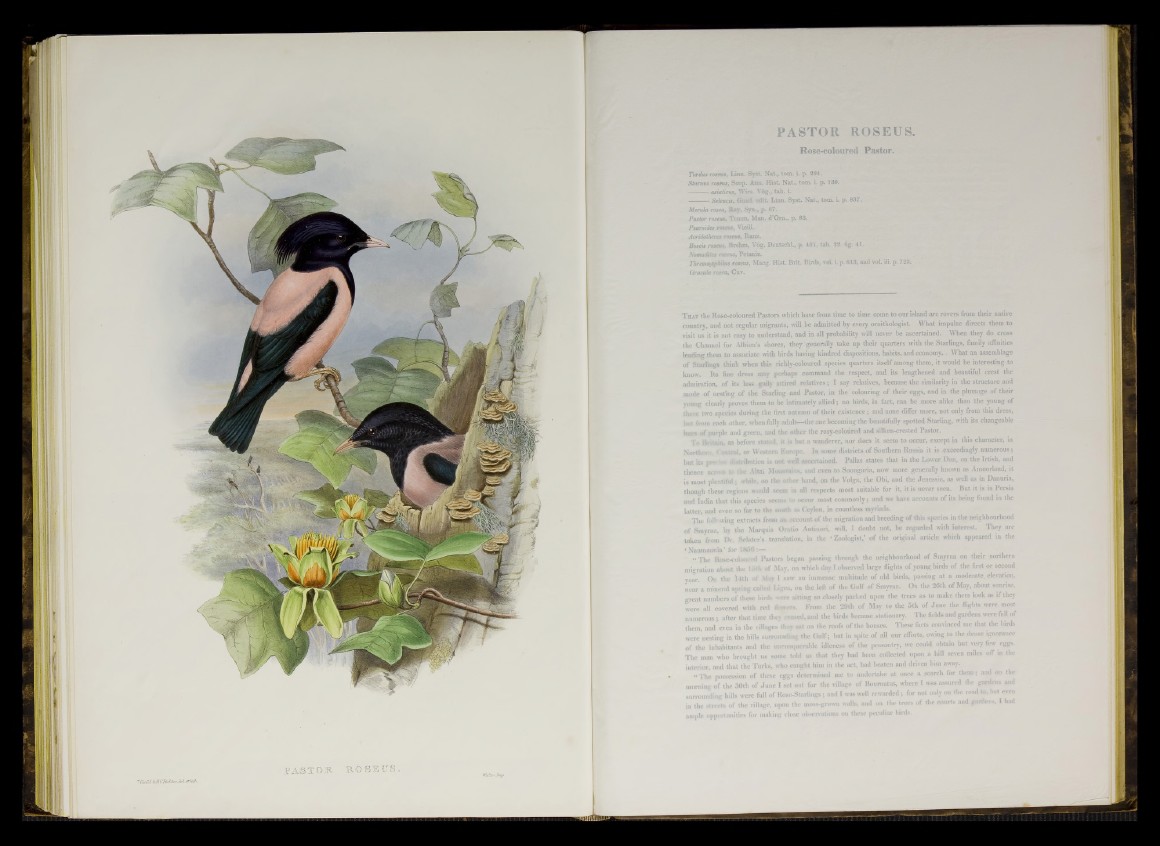
P A S I O R R O SEKTS.
TGmkl kKCRdlLcr.M. ahlb,.
P A S T O R R O S E U S .
Rose-coloured Pastor.
Ttsrdtu roseta, Linn. Syst. Nat., tom. i. p. 294.
Stumta roseta, Scop. Ann. Hist. Nat., tom. i. p. 130.
—7 asialictu, Wirs. Vog., tab. L '
Seleucis, Grad. «lit. Linn. Syst. Nat., tom. i. p. 837.
Merula rosea, Ray, Syn., p. 67.
Pastar roseas, Temm. Man. d ’Orn., p. 83.
Psaroides roseta, Vieill.
Aeridotheree roseta, Ranz.
Boscis rosetu, Brehm, Vög. DeutschL, p. 401, tab. 22. fig. 41.
Nomadites roseta, Petaniz.
ThremmapkUiis roseta, Macg. Hist. Brit. Birds, vol. i. p. 613, and vol. iii. p. 723.
Gracula rosea, Cuv.
T h a t the Rose-coloured Pastors which have from time to time come to our island are rovers from their native
country, and not regular migrants, will be admitted by every ornithologist. What impulse directs them to
visit us it is not easy to understand, and in all probability will never be ascertained. When they do cross
the Channel for Albion’s shores, they generally take up their quarters with the Starlings, family affinities
leading them to associate with birds having kindred dispositions, habits, and economy. What an assemblage
of Starlings think when this richly-coloured species quarters itself among them, it would be interesting to
know. Its fine dress may perhaps command the respect, and its lengthened and beautiful crest the
admiration, of its less gaily attired relatives; I say relatives, because the similarity in the structure and
mode of nesting of the Starling and Pastor, in the colouring of their eggs, and in the plumage of their
voting clearly proves them to be intimately allied; no birds, in fact, can be more alike than the young of
these two species during the first autumn of their existence; and none differ more, not only from this dress,
b«i from each other, when folly adult—the oue becoming the beautifully spotted Starling, with its changeable
gf purple and green, and the other the rosy-coloured and silken-crested Pastor.
To Britain, as before stated, it is but a wanderer, nor does it seem to occur, except in this character, in
Northern. C'-«9tral, or Western Europe. In some districts of Southern Russia it is exceedingly numerous;
but its priv et distribution is not well ascertained. Pallas states that in the Lower Don, on the Irtish, and
thence across fa* the Altai Mountains, and even to Soongaria, now more generally known as Amoorland, it
is most plentiful j while, on the other hand, on the Volga, the Obi, and the Jcnessie, as well as in Danuria,
though these regions would seem in all respects most suitable for it, it is never seen. But it is in Persia
and India that this species seems to occur most commonly; and we have accounts of its being found in the
latter, and even so far to the south as Ceylon, in countless myriads.
The foU' wing extracts from an account of the migration and breeding of this species in the neighbourhood
of Smyrna, by the Marquis Oratio Antiuori, will, I doubt not, be regarded with interest. They are
taken from Dr. Sclater’s translation, in the • Zoologist,’ of the original article which appeared in the
‘ Naumaunia ’ for liwfi :■— . • t
•• The Rose-coloured Pastors began passing through the neighbourhood of Smyrna on their northern
migration about the ISA of May, on which day I observed large flights of young birds of the first or second
year. On the Uth of Moy I saw an immense multitude of old birds, passing at a moderate, elevation,
near a mineral spring called Ugea, on the left of the Golf of Smyrna. On the 26th of May, ahoat sunrise,
great numbers of these birds were sitting so closely packed upon the trees as to make them look as if they
were all covered with red fowers. From the 29th of May to the 5th of June the flights were most
numerous; after that time they erased, and the birds became stationary. The fields and gardens were fi.ll of
them, and even in the villages they sat on the roofs of the houses. These facts convinced me that the birds
were nesting in the hills surrounding the Gulf; but in spite of all our efforts, owing to the dense ignorance
of the inhabitants and the unconquerable idleness of the peasantry, we could obtain but very few eggs.
The man who brought us some told us that they had been collected upon a hill seven miles off m the
interior, and that the Turks, who caught him in the act, had beaten and driven him away.
The possession of these eggs determined me to undertake at once a search for them; and on the
morning of the 30th of June I set ont for the village of Bournatut, where I was assured the gardens and
surrounding hills were full of Rose-Starlings: and I was well rewarded ; for not only on the road to, but even
in the streets of the village, upon the mass-grown walls, and on the trees of the courts and gardens, I had
ample opportunities for making close observations on these peculiar birds.